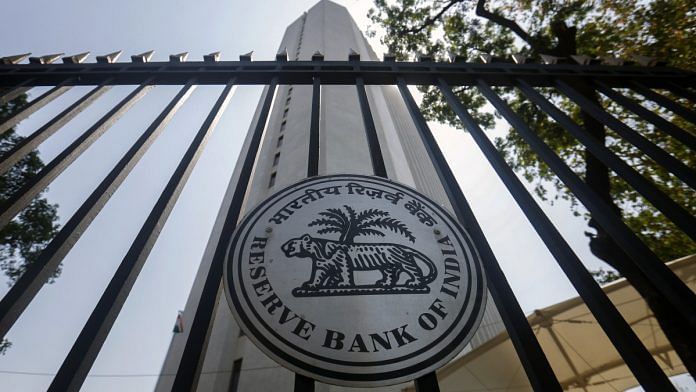New Delhi: The fiscal space for the Union government to continue support to demand in the economy may be “severely diminished” given the impact of Covid-19 on government finances, the Reserve Bank of India (RBI) said in its annual report Tuesday.
For states, the “space is likely to be squeezed so much that cuts in growth-giving capital expenditure seem quite probable”, it said.
The central bank also warned of potential output losses once the unwinding of the stimulus measures and regulatory easing starts after the pandemic.
To ensure strong and sustainable growth, the RBI called for “deep-seated and wide ranging” structural reforms.
It also batted for a credible fiscal consolidation plan and specific action points to reduce debt and deficit levels in the aftermath of the pandemic, pointing out that the fiscal policy will have to contend with a large overhang of debt and contingent liabilities incurred during the pandemic.
“A credible consolidation plan, specifying actionables for reduction of debt and deficit levels, will earn confidence and acceptability, rather than just extending the path of touch-down,” it said.
The Covid pandemic and the subsequent lockdowns brought all economic activity to a halt, adversely impacting tax revenues of both the Centre and the states. At the same time, expenditures have risen sharply as the governments look to combat the virus.
Also read: Loan restructuring plan will help revive economy, RBI Governor Shaktikanta Das says
On recovery
In the report, the RBI pointed out that the economic recovery now will be different than what was witnessed in the aftermath of the global financial crisis (GFC) of 2008.
“As in the rest of the world, India’s potential output can undergo a structural downshift as the recovery driven by stimulus and regulatory easing gets unwound in a post-pandemic scenario,” it said.
“…the GFC occurred after years of robust growth with macroeconomic stability; by contrast, COVID-19 has hit the economy after consecutive quarters of slowdown. Furthermore, the GFC was essentially a financial meltdown whereas the pandemic is a health crisis, which has deleterious ramifications across real and financial sectors,” the central bank said.
It said that the government would need to take concrete steps to bring the economy back to a path of sustainable growth.
“As stimulus is unwound in a calibrated and non-disruptive manner in a post-pandemic scenario, deep-seated and wide-ranging structural reforms in factor and product markets, the financial sector, legal architecture, and in international competitiveness would be needed to regain potential output losses and return the economy to a path of strong and sustainable growth with macroeconomic and financial stability,” said the RBI.
The Indian economy is expected to contract by around 10 per cent in 2020-21, according to the latest projections by economists. In the first quarter of 2020-21, the worst hit by the pandemic, the economy could contract by as much as 15-20 per cent.
Also read: RBI’s first Monetary Policy Committee bows out, its record sullied by inflation at the end
Recovery losing steam in July and August
The RBI said that high frequency indicators so far point to a retrenchment in activity that is “unprecedented in history”.
“The upticks that became visible in May and June after the lockdown was eased in several parts of the country, appear to have lost strength in July and August, mainly due to reimposition or stricter imposition of lockdowns, suggesting that contraction in economic activity will likely prolong into Q2,” it said.
Many states like Tamil Nadu, West Bengal and Karnataka reintroduced lockdowns in the last couple of months as they tried to curb the spread of the pandemic. But this introduced an element of uncertainty for local businesses and manufacturing units.
Shock to consumption severe
The RBI also pointed out that the shock to consumption is severe and may take quite some time to regain the pre-Covid momentum as reflected by the plunging consumer confidence levels.
“Private consumption has lost its discretionary elements across the board, particularly transport services, hospitality, recreation and cultural activities. Behavioural restraints may prevent the normalisation of demand for these activities,” the report said.
It added that going forward, government consumption is expected to continue “pandemic-proofing of demand” and rural demand leading the recovery.
“As the winddown begins and consolidation resumes, it is prudent to expect lower contributions of GFCE (government final consumption expenditure) to overall demand,” it said.
Need to evaluate GST experience
The RBI also stressed the need to boost revenues and advocated an evaluation of the goods and services tax (GST).
“It is worthwhile to consider an evaluation of the experience with GST by an independent committee which can draw on the lessons gained so far to recommend the way forward,” said the report.
It favoured addressing the challenges confronting the GST regime through rationalisation, simplification of returns and procedures, including automatic invoice matching, intelligence, enforcement, inspection and audit.
Also read: After Ambani, it’s Adani who’s beginning to carve up India’s post-Covid business monopoly



